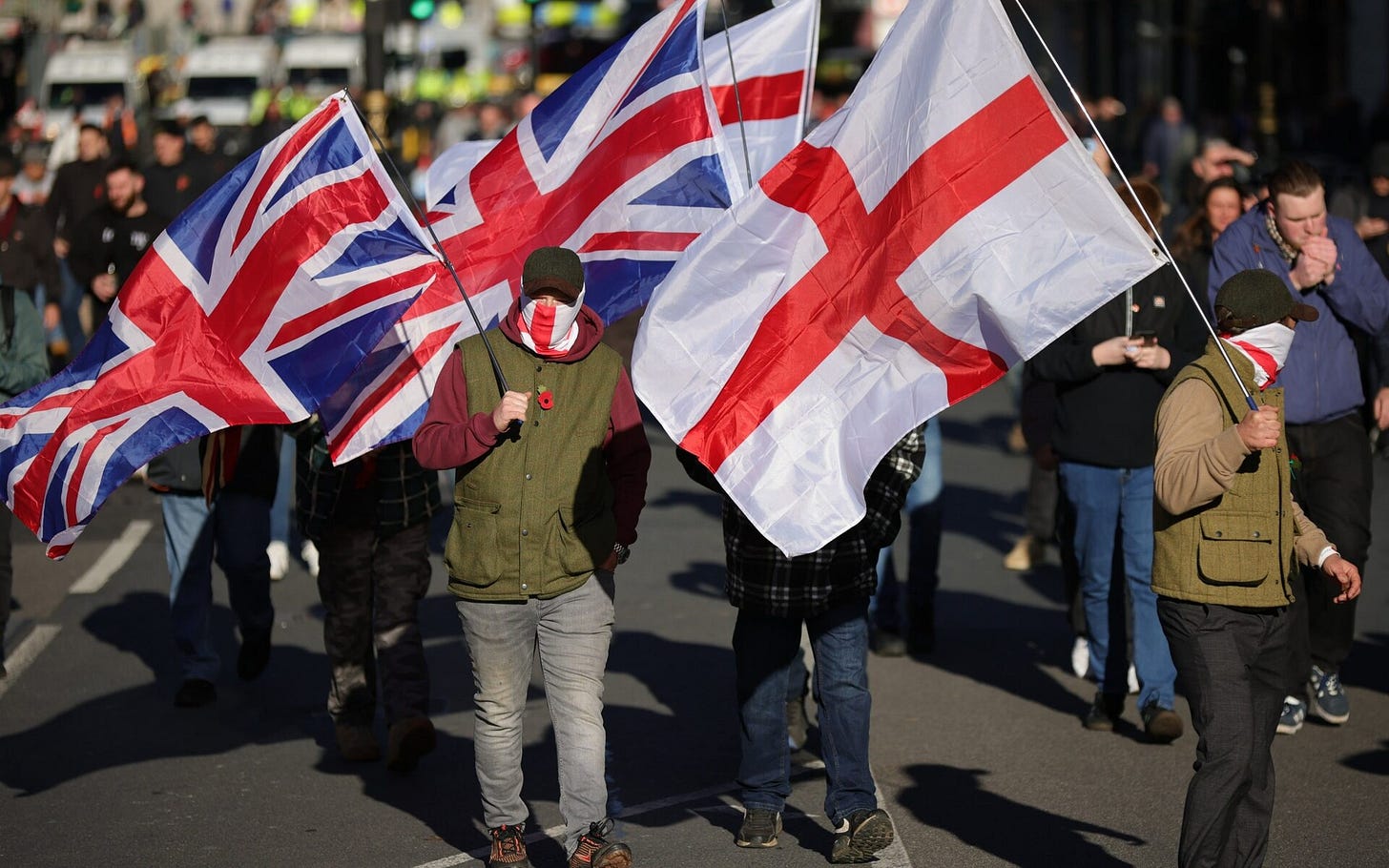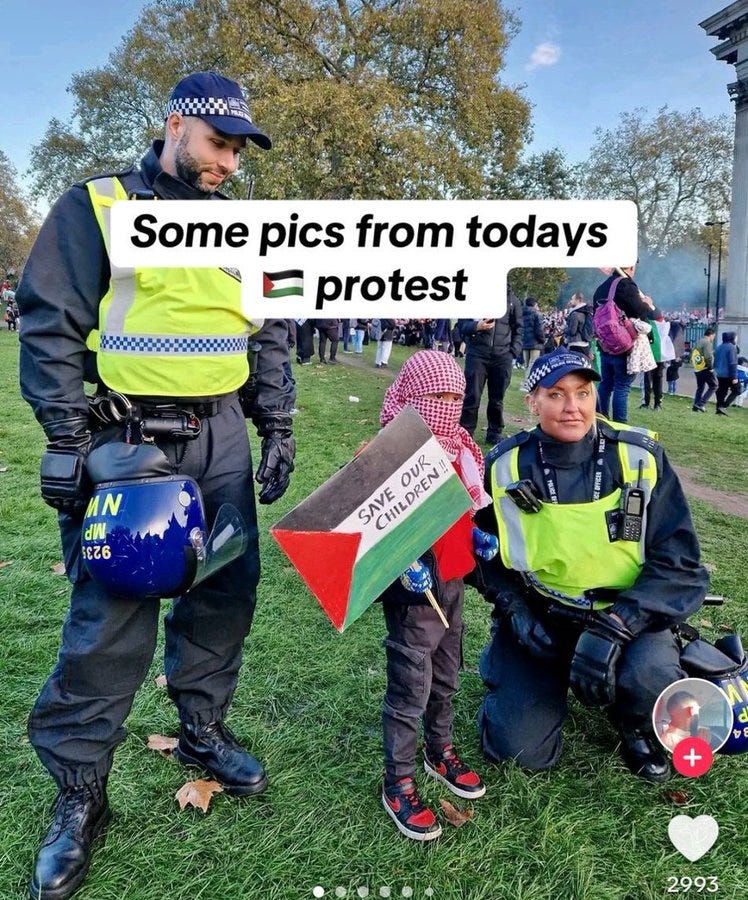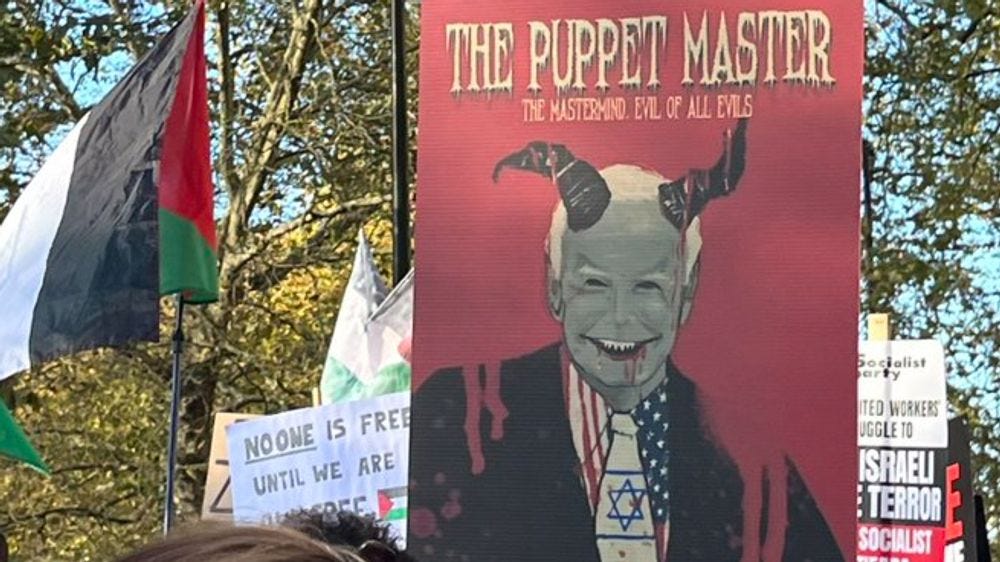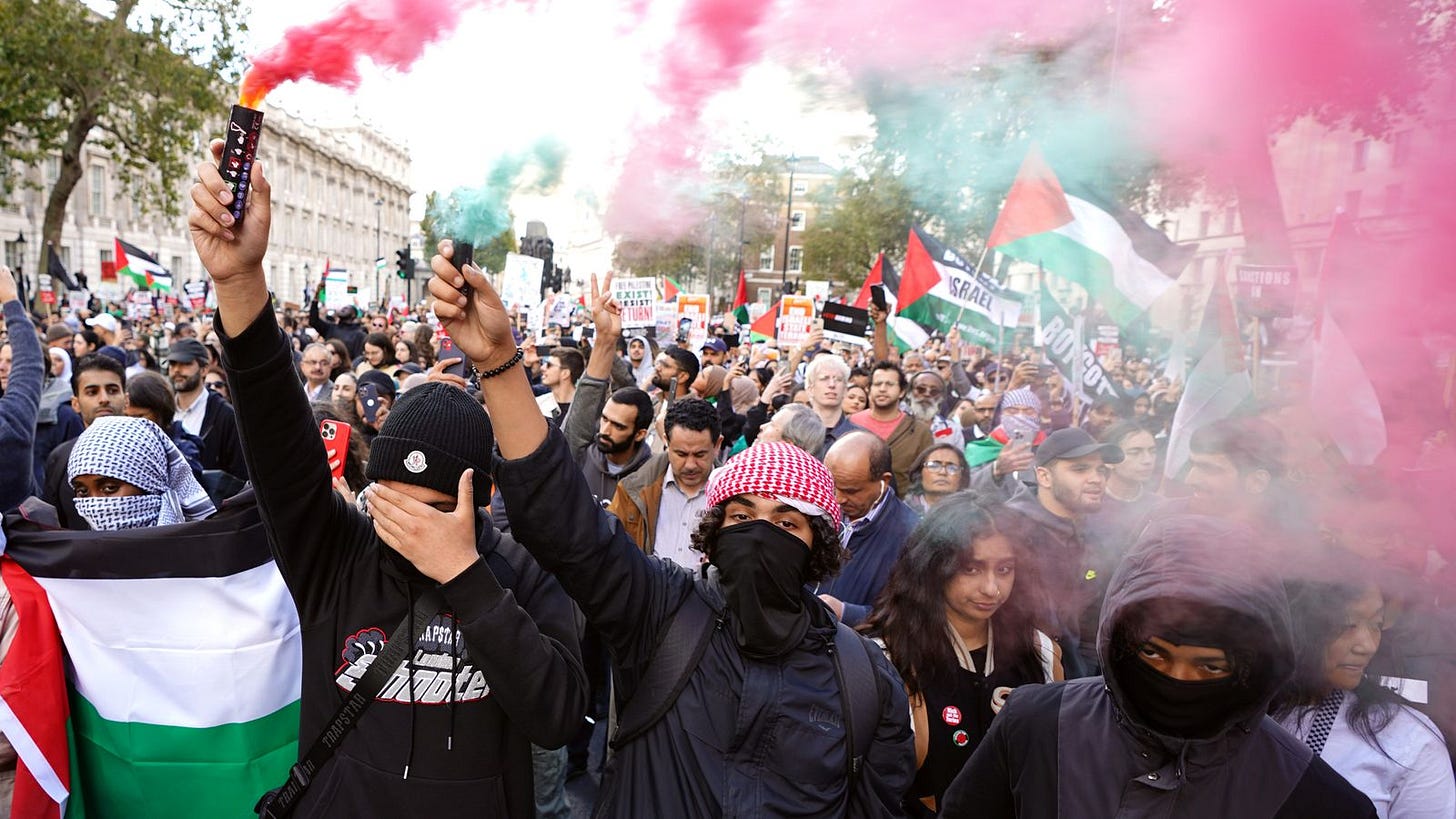'Losing while appearing to Win?'
Palestine, Protest and the Police
‘Football Lads’ counter-protesting in London, November 11th 2023
There’s an age-old concept in British policing, often applied in a public order context. It’s called ‘winning while appearing to lose’, the idea that a softy-softly approach might look weak, but is paradoxically strong.
Why?
Because the primary objective of maintaining the King’s Peace is met without using physical force. Bending, but not breaking. Being seen to ‘go in hard’ to enforce the law threatens the holy grails of State legitimacy and policing by consent. It’s an iron rule of British policing, which no ambitious senior officer would dare challenge. It’s rolled out every year, for example, at the Notting Hill Carnival. Furthermore, UK supreme court and ECHR rulings have created a legal cat’s cradle, one which makes policing public order akin to spinning a hundred plates while wearing greased roller skates.
Coming to think of it, it’s an iron rule no Home Secretary should challenge either.
The British establishment, having never suffered a proper revolution, doesn’t view civil unrest as a kind of societal pressure valve (like, for example, the French do). They see it as a fundamental failure of a liberal, common law system of governance. A thread which, once tugged, might unravel the entire tapestry. This is why you don’t see British cops using CS gas at demonstrations. It’s why the authorisation process for using baton rounds is so complex as to be near pointless. It’s why when a Mayor of London tried to buy a second-hand water cannon from the German police, pearls were clutched as if Boris Johnson was advocating Tiananmen Square-style tactics (rather than making some angry demonstrators a bit soggy).
Today, I’m going to argue recent events in British politics means this mantra has been inverted, that the Metropolitan Police now chooses to ‘lose while appearing to win’. That doesn’t mean I’m totally hitched to the Suella Braverman bandwagon, although she was onto something about inconsistencies in police attitudes to protest. Nonetheless, her newspaper article was inappropriate in the context of collective responsibility - she had to go.
Losing while appearing to win. What do I mean?
On Saturday 11th November, Armistice Day, the Metropolitan Police were tasked with managing a large protest against Israel’s intervention in Gaza. Previous events were notionally ‘peaceful’ but occasionally intimidating, including blatant displays of antisemitic images and use of language contrary to public order and terrorism legislation. Furthermore, London’s Jewish community felt intimidated and isolated. There were incidents of Jews being harassed at synagogues.
As per their usual doctrine, the Met policed these protests gently, reasoning (1) they were hugely outnumbered and (2) the novelty would wear off, people would have made their point and things would get back to normal. Except, things didn’t get back to normal. It became a perfect storm of identity politics, domestic political weakness and creeping antisemitism. It emboldened activists sympathetic to a proscribed terrorist organisation.
Then, the organisers declared another huge march for Armistice Day on the 11th November. If you don’t think they weren’t aware of exactly what they were doing by choosing that date, maybe you’d like to buy a timeshare I’ve got for sale. It’s near the southern Lebanese border.
With the current UK government shuffling off to the knacker’s yard, the British body politic decided a conflict 2500 miles distant - one in which we enjoy extremely limited influence - was an existential issue (while remaining strangely silent on every other war across the Globe where civilians - predominantly Muslim civilians - were suffering). Everyone held a view on banning the demonstration or not banning the demonstration. A demonstration, it should be remembered, held on a day of near-sacred importance to many Britons.
Enter the Metropolitan Police, the poor bastards expected to deal with it all.
I genuinely believe Sir Mark Rowley, schooled in public order orthodoxy at staff college, believes in ‘winning by appearing to lose’. He also undoubtedly subscribes to the sanctity of operational independence, despite the nonsense of his dual bosses (as of Saturday) being the oil-and-water duo of Suella Braverman and Sadiq Khan. Yet he’s as political as any of them - and if he wasn’t, he wouldn’t be the Commissioner of Police for the Metropolis.
I also believe it’s entirely possible Sir Mark didn’t possess the necessary information to apply for a banning order under s.13 of the Public Order Act. This is because the Met doesn’t overly concern itself with public order intelligence nowadays, instead relying on liaison with protest organisers and open-source material (during my service I saw first-hand how badly the Met’s capability was degraded).
So it was easy for Sir Mark to say, ‘I’ve no intelligence case to ban this protest’ because he’d limited intelligence reporting in the first place. Having said that, I’ve seen senior police officers spin intelligence product any way they wished it to go. I doubt that’s changed, or ever will.
Police officers posing with a child enjoying some Hamas cosplay. The Met apologised. I doubt a safeguarding report to PREVENT was submitted.
My personal view is, on the 11th November, Sir Mark Rowley’s Met had a good day. The Met ‘won’.
From a technical perspective, it was a successful public order policing operation, but;
Conversely, this was a divisive public order policing operation, one which will do little to resolve long-term issues of extremism and social cohesion.
The plan was logical and well-implemented. Isolate any pockets of trouble. Dictate scheduling and routing. Have a mix of dedicated protest march escort and mobile officers to interdict stragglers. Most police officers with a public order background would have anticipated much of it.
The jokers in the pack, the amusingly named ‘Football Lads Against Extremism’ (the average ‘lad’ appeared to be in his early fifties) turned out looking for a fight. The decision to let them attend the Cenotaph was a judgement call, one which the police ‘Gold’, DAC Laurence Taylor, made for the right reasons (he was damned either way). This group, of nearly a thousand, was poorly-organised and devoid of proper organisation (some were heard desperately asking for the next ‘mobbing up point’ on their phones). ‘Tommy Robinson’, the former EDL organiser, reportedly disappeared in a taxi after the initial skirmishes.
This left independent groups of troublemakers looking for Pro-Palestine demonstrators to confront. One group of 80 or so were (quite properly) kettled and arrested near Pimlico (how refreshingly robust) to prevent further disorder. This was solid public order policing.
The Palestinian protest was successfully escorted from Hyde Park to the American Embassy in Battersea, the procession timed to begin after the Armistice ceremony was complete. There were minor spats and confrontations. Some arrests were made. Fireworks were let off. Jeremy Corbyn made another dreary speech. The predictable ebb and flow of a typical mass demonstration.
Yet I couldn’t help but think… this time was different. Yes, I think the Met ‘won’ but, in doing so, the country lost. We remain a house divided. All of the old nostrums about consent and operational independence and separation of powers? Do they even matter anymore? Were they fig leaf to begin with? There used to be a broad consensus in our society, one that took a dim view of terrorist-supporting demonstrators marching on Armistice Day.
Yet on the 11th, we normalised hate. In the name of what? Keeping the King’s Peace? What sort of peace is that?
You either agree tolerating violent, extremist rhetoric eventually paves the way for terrorism, or you don’t. I’m a staunch advocate of freedom of speech - I’m also a staunch advocate of not allowing public support for Hamas’s terrorism. This is the Met, as I’ve written before, which is muscular around other types of ‘hate’ speech (especially stuff which isn’t remotely ‘hateful’, except in the ideology-addled minds of obsessive activists).
In these circumstances, I would argue the Police are going to return to thinking harder, and smarter, about the connection between politics, protest and extremism. To quote Stalin, a polished practitioner of extremism, you might not be interested in the war, but the war’s interested in you.
Is this ‘winning?’ Antisemitism openly on display in London, 2023
Violent extremism is unambiguously a police concern; politically-motivated crime exists on the same spectrum as terrorism. For some, it’s a conveyor belt. Sir Mark will only get away with playing his ‘I’ve no adverse intelligence’ card for so long, until an attendee of these demonstrations goes on to commit an act of terrorism. Then he’ll be asked (not unreasonably) why the intelligence cupboard was bare.
This goes, incidentally, for both sides. The extreme right are politically moribund in the UK outside of amorphous football-aligned groups (who, ideologically, aren’t particularly ‘extreme’ right wing) and murky, usually online neo-Nazis (who are VERY right wing). This wasn’t always so, as those of us old enough to remember the National Front and BNP (which ceased to exist in 2010) will tell you. David Copeland, the notorious nail-bomber who exploded devices in Brixton, Brick Lane and Soho, was radicalised via extreme right-wing political parties (he found the BNP too pedestrian for his tastes, moving on to bizarre online grouplets before deciding to launch his one-man hate war).
And guess what? Copeland wasn’t lavishly funded by the Iranians, unlike Hamas and other Islamist groups looking to attack the ‘Little Satan’ of the UK (America, of course, being the Big Satan).
What, you might ask, does this have to do with people waving placards? What else can the police realistically do?
Pro-Palestinian protestors light maroons in London.
I’m sympathetic to the huge demands placed on the Met, and especially the rank-and-file officers at the sharp end. I’m simply concerned, by playing the ‘winning by appearing to lose’ card, the Met are conceding ground they’ll never win back. The terrain isn’t one merely of the streets. It’s also one of ideas, and ideals. Those are, after all, what influences our laws in the first place.
My thoughts;
We need joined-up political leadership. I know, stop laughing at the back. Without it, the police will become directionless. This is more complex than centrist dads, enjoying modish ‘Suella is Satan’ puns, would have you believe. The Government also needs to make its mind up about the law - and in particular the ECHR’s impact on police latitude.
Are UK police services equipped and prepared to proactively monitor threats from hostile actors, seeking to radicalise individuals over the Palestinian issue? (I know, it’s back to the 70s, isn’t it?) That means intelligence operations at a lower threshold than terrorism - just shy of the sort MI5 pursue. Right now, the next David Copeland (or Islamist analogue) is simmering alone in his room. And we don’t know who he is, or if we do, we’re not doing enough about him. Yes, this is an ex-special branch officer speaking. Getting rid of us was a terrible idea.
PREVENT needs steroids, and in any case serious reform.
The Police need to learn how to say ‘no’ to protest groups, and when to back those words with action. They also need to stop inviting partisan activist-cum-advisors into control rooms. Doesn’t that idea just reek of someone chasing promotion?
Police should deal with blatantly illegal hate speech and material on the day and not overly rely on post-incident investigation (see 4, above).
We badly need a Home Secretary who isn’t on manoeuvres, one prepared to ‘reach across the aisle’ and work with the Mayor of London (who, in turn, needs to do likewise). I hope James Cleverley provides that. I don’t think Khan is capable though - he’s too much of a partisan. Please, Sadiq, prove me wrong.
And if we do none of these things? I think politics really is like science. To wit, (a) nature abhors a vacuum and (b) every action has an equal and opposite reaction.
Make of that what you will. But it isn’t good.
I was at the Cenotaph for Remembrance. A drizzly, greyish London Sunday. There was a large, good-natured police presence (the Welsh officers on mutual aid, asked for directions by tourists, looked suitably baffled). The streets were packed. Things went smoothly, bemedaled veterans cheerfully greeting each other in pubs after the parade. You might never have known there was a huge protest in London the day before.
For this, we should be grateful to the Met.
Yet people, down here in the real world, are uncomfortable about demonstrations that look more like a show of strength than a protest. These people aren’t habitual Twitter devotees, so their views are often ignored. They feel ‘the time is out of joint’, wondering why the police tolerate this but not that. Whisper it quietly, lest you find yourself cancelled from polite society, but beyond our university cities and Zone 2 of the London Underground, some whisper how grandstanding Suella Braverman wasn’t entirely wrong.
And so, yesterday, I passed the underwhelming New Scotland Yard building. A shadow of what went before. There’s a bust of Sir Robert Peel in a glass case outside, beneath the words ‘The Police are the Public and the Public are the Police’.
Smiling ruefully, I ambled away for a pint.





Society evolves. The Police have not. We're deluding ourselves thinking the Police wield real influence as to how society behaves. The Government/Courts decide what tools the Police have and how they should be used. You want me to mend your boiler? Why have you just given me a hammer then?
An example... The Police should take action against those on the march, who by their words or actions demonstrate Anti-Semitism. Let's brief on Anti-Semitism.
The International Holocaust Remembrance Alliance (IHRA) definition (adopted as a 'working definition' by the governments of more than 32 countries, including the US, UK, France, Germany and Canada)
“Antisemitism is a certain perception of Jews, which may be expressed as hatred toward Jews. Rhetorical and physical manifestations of antisemitism are directed toward Jewish or non-Jewish individuals and/or their property, toward Jewish community institutions and religious facilities.” 11 examples are provided.
Heavy pushback however that the IHRA definition risked conflating legitimate criticism of the Israeli government with Anti-Semitism. The UK Labour party tied itself in knots over whether they should adopt the definition. The situation in UK universities was particularly strained. University College London's academic board declined to adopt it, saying that the IHRA definition could have “potentially deleterious effects on free speech, such as instigating a culture of fear or self-silencing on teaching or research or classroom discussion of contentious topics”. Education Secretary Gavin Williamson made the UK Government's position clear when in 2020 he said, the higher education regulator for England could be asked to take regulatory action including suspending “funding streams” if British universities failed to adopt the IHRA definition by the end of December.
There... sorted. Oh hang on, still a bit of confusion as to whether criticism of the Government of Israel is inherently Anti-Semitic, particularly with regard to Zionism and the 'Palestine situation'. In 2019, the IHRA definition’s lead author, Kenneth Stern, said it “was never intended to be a campus hate speech code” and complained that right wing Jewish groups had weaponized it in the US, thanks to President Trump including 'the definition' in an executive order amending the Civil Rights Act. Cases were being brought which attempted to criminalise speakers, assigned texts and protests, said to violate the definition.
Thought experiment... if we draw up a similar definition regarding racism against black people, should we say that criticism of affirmative action programs is inherently racist? Would that strike you as an attempt to suppress legitimate discussion? That's how the IHRA definition is being used, and this shit show is why we can look at the same incident and argue as to whether there's been Anti-Semitism.
Police shouldn't try to negotiate/interpret the political. It doesn't lend itself to decisive action. Those 'yes but', 'bigger picture' and 'what will 'community groups' say?', Senior Officers have got us to the situation we are in today... We have a simple job, where are the boundaries, enforce the boundaries. Our collective experience and knowledge should be directed entirely to the practical aspects of enforcement, not the political. Don't pick and choose which causes/views have enforcement, there must be equality of outcome, so a supporter of BLM or EDF taking the same actions face the same outcome. We arrest, the courts tell us if we've got it right.
Some might say 'but we avoided an outbreak of disorder'... well whoop y-do to you. Avoiding a negative outcome is easy, look at France's capitulation in WW2. Avoiding a negative is not a positive. Officers on the sharp end are not served well, legitimate protesters see extremists tainting their message, Anti-Semites are emboldened and the general public see an ineffective Police Service. That is not a battle lost in order to win the war, that is just another battle lost.
Having equated senior officers to the Vichy government, I might as well finish with an apposite quote from a Marxist.
He who fights, can lose. He who doesn’t fight, has already lost. – Bertolt Brecht
Sorry! tidied up and reposted
I resigned from the met 2 months ago after 15 years and am glad I'm not complicit. I'm appalled at what I've seen the last 6 Saturdays. Nothing to do with freedom to protest and everything to do with intimidation. It is an anti-british march and to me is what a Nazi brownshirt rally may have been like in 1930's germany. Last week was the 85th anniversary of Kristallnacht which has passed most people by. Do British Jews now feel like German Jews did? Here, in Britain in the 21st century? A senior Hamas chief living openly in Hendon, with counter terrorism Policing informed in 2020. Political wing proscribed around the same time. Policing has been two tier just as for the BLM disorder, a Rotherham 2.0.
Nothing petrify's the met more then a charge of racism. Met bans an israeli hostage solidarity march through golders green. Happy to wade into a Sarah Everard vigil for the crime of... COVID breaches. Happy to police mean tweets for anything relating to trans issues. I believe met has completely undermined its own policing principles and so their own authority and legitimacy. If met were seen to be doing their job instead of standing by squirming while mobs chanting for the extinction of Israel, there simply would not have been any counter protests this weekend. When these white protesters 'far right'(?) came out, met suddenly remembered how to police, kitted up, batons drawn, 100 plus arrests. Of course 1,000 cops cannot police a crowd of 100,000 and I understand the concept of 'winning by appearing to lose' in public order policing. I've been there, policing JSO slow walks and seeing the look of disgust from the public so not intended to criticise the rank and file. An officer will be served gross misconduct papers for arresting someone for fare evasion these days! I am an Afghan veteran and former SO15 borders officer. I perceive in media, much talk and prominence of XRW, as if somehow equivalent and counter balancing to Islamic extremism. Attacks and the data do not support this. I believe the Met has lost a large section of law abiding majority over this and much else in the last 5 years.